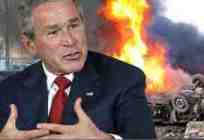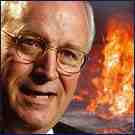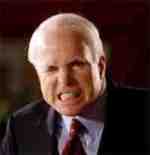Bush says Renewed Violence in Iraq is a Positive Moment

The administration has gone on a desperate PR blitz to label renewed violence in Iraq as "byproduct of the success of the surge." It is "what critics have wanted to see," said White House Press Secretary Dana Perino, calling it a struggle led by Iraqi security forces. "The State Department has instructed all personnel at the U.S. Embassy in Baghdad not to leave reinforced structures due to incoming insurgent rocket fire that has killed two American government workers this week." As rockets rain down on the Green Zone and two American soldiers died -- Bush cast the activity as a "very positive moment" in an interview with the Times of London. "It was a very positive moment in the development of a sovereign nation that is willing to take on elements that believe they are beyond the law," the President said. It's hard to see what Bush sees as positive. The explosion that burst an oil pipeline in Basra? Tens of thousands of Shiite protesters in Baghdad? A kidnapped "civilian spokesman for the Baghdad security operation?" In reality, the violence is undoing the very goals of Bush's surge. Iraqi forces aren't trying to restore "the law," as Bush thinks, but are trying to do the opposite -- suppress its political enemies before the October elections, historian Reidar Vissar noted. Most ironically, if U.S.-backed efforts "succeed," Iran's hand in Iraq will be strengthened. [MORE]
 ADMINISTRATION -- HAGEL SLAMS CHENEY'S CALLOUS IRAQ COMMENTS AS NOT 'OUT OF CHARACTER: Last week, Vice President Cheney made notorious comments exemplifying his distance from the situation on the ground in both Iraq and the United States. When asked about the sour public opinion on the war, he replied "So?" And when asked about 4,000 dead U.S. troops, he said, "The President carries the biggest burden, obviously." But in two interviews this week on NPR, Sen. Chuck Hagel (R-NE) ripped Cheney's callousness towards the public and the troops on the ground. Hagel told Dianne Rehm on Tuesday that he didn't think the "So?" comment "was out of character for the Vice President." On NPR's On Point on Wednesday, Hagel again went after Cheney, saying that his sense of Bush's "burden" in the war is ironic coming from a Vietnam draft dodger. "There is a credibility gap here, at least a little bit, with the Vice President, as far as I'm concerned," said Hagel. "Here's a guy who got five deferments during the Vietnam War, said publicly that didn't work into his plans." The public agrees with Hagel. A recent World Public Opinion poll found that 81 percent of Americans believe that when making "an important decision," government leaders "should pay attention to public opinion polls; 94 percent want this done 'in between elections.'"
ADMINISTRATION -- HAGEL SLAMS CHENEY'S CALLOUS IRAQ COMMENTS AS NOT 'OUT OF CHARACTER: Last week, Vice President Cheney made notorious comments exemplifying his distance from the situation on the ground in both Iraq and the United States. When asked about the sour public opinion on the war, he replied "So?" And when asked about 4,000 dead U.S. troops, he said, "The President carries the biggest burden, obviously." But in two interviews this week on NPR, Sen. Chuck Hagel (R-NE) ripped Cheney's callousness towards the public and the troops on the ground. Hagel told Dianne Rehm on Tuesday that he didn't think the "So?" comment "was out of character for the Vice President." On NPR's On Point on Wednesday, Hagel again went after Cheney, saying that his sense of Bush's "burden" in the war is ironic coming from a Vietnam draft dodger. "There is a credibility gap here, at least a little bit, with the Vice President, as far as I'm concerned," said Hagel. "Here's a guy who got five deferments during the Vietnam War, said publicly that didn't work into his plans." The public agrees with Hagel. A recent World Public Opinion poll found that 81 percent of Americans believe that when making "an important decision," government leaders "should pay attention to public opinion polls; 94 percent want this done 'in between elections.'"
 Bush Clone McCain Vows No Retreat from Iraq
Bush Clone McCain Vows No Retreat from Iraq
Fresh off his eighth Iraq visit, Sen. John McCain declared that "we are succeeding" and said he would not change course even as the U.S. death toll rose to 4,000 and the war entered its sixth year. "We're succeeding. I don't care what anybody says. I've seen the facts on the ground," the Arizona senator insisted a day after a roadside bomb in Baghdad killed four U.S. soldiers and rockets pounded the U.S.-protected Green Zone there, and a wave of attacks left at least 61 Iraqis dead nationwide. The events transpired as bin Laden called on the people of Syria, Lebanon, Jordan and Saudi Arabia to "help in support of their mujahedeen brothers in Iraq, which is the greatest opportunity and the biggest task." Despite all that, McCain told reporters: "I don't think I would change the strategy now unless General Petraeus recommended it. I think he's trusted by the American people, the president and by me. And General Petraeus again showed me facts on the ground where the surge is succeeding." "We have incurred a moral responsibility in Iraq. It would be an unconscionable act of betrayal, a stain on our character as a great nation, if we were to walk away from the Iraqi people," he said. Such a "premature" and "irresponsible" US exit would consign Iraqis to horrendous violence, ethnic cleansing and possibly genocide, McCain said. "Success in Iraq and Afghanistan is the establishment of peaceful, stable prosperous, democratic states that pose no threat to neighbors and contribute to the defeat of terrorists.
Obama Says He Would Withdraw US Troops After Taking Office
The CBS Evening News (3/27, story 3, Smith,) reported, "On the presidential campaign trail, Barack Obama has long said he'd start withdrawing US troops from Iraq shortly after taking office. In a one-on-one interview here in New York today, I asked the senator if that's really possible with Iraq so unstable." Obama: "When the violence was high, John McCain and George Bush said we can't leave because the violence is high. When we reduced the violence, they said we can't leave because we've made progress. This is part of the problem that we have. A lot of tactics that have been effective by General Petraeus, but no overarching strategy. There's no clear definition of success."